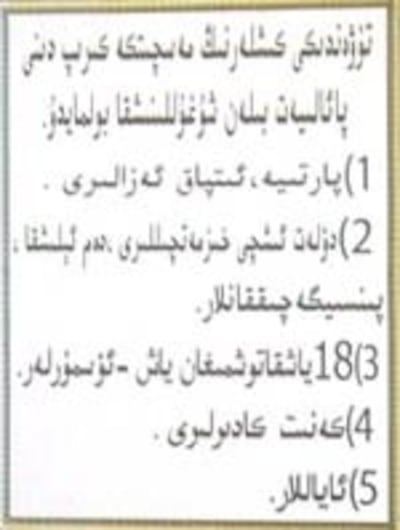
HONG KONG—Chinese authorities have tightened curbs on minority Muslims in the northwestern region of Xinjiang, banning any government officials, state employees, Party members, and in some cases women from entering mosques.
A photo sent to RFA’s Uyghur service shows a sign above the gate of a mosque in the poorer southern part of the Xinjiang Uyghur Autonomous Region, forbidding Muslims to attend for worship—as they are supposed to do five times a day.
“The following people are prohibited from entering the mosque and conducting religious activities,” reads the sign, written in the language of the main Muslim ethnic group, Uyghur, which uses the Arabic alphabet.
The following people are prohibited from entering the mosque and conductingreligious activities:1) Communist Party members and Communist Youth members.2) State employees, workers and retirees.3) Youth under the age of 18.4) Prefecture employees.5) Women.
“1) Communist Party members and Communist Youth members. 2) State employees, workers, and retirees. 3) Youths under the age of 18,” it says. Categories four and five are local government employees and women, the first time such gender restrictions have been alluded to.
An imam, or religious teacher, at the Heitkar Mosque in Kashgar, the biggest mosque in the region, confirmed some of the restrictions, although his initial reply seemed aimed at avoiding direct criticism of Chinese Communist Party policy.
Imam's awkward responses
Asked who was allowed to worship in Xinjiang’s mosques, the imam replied: “Everybody. Every Islamic believer is allowed.”
But confronted with restrictions in other mosques, he confirmed that such rules did exist at Heitkar, too.
“Same. It is same here in our Heitkar mosque too. Our policies are all same,” the imam said.
Several Uyghur Muslims confirmed to RFA that those who fell under certain categories were unable to attend mosque for daily prayers, or even for major festivals such as Eid al-Fitr at the end of the fasting month of Ramadan, or Eid al-Adha at which sheep and goats are sacrificed to recall the sparing of Abraham’s son Ismail.
Uyghurs are seen by Beijing as an ethno-nationalist threat to the Chinese state. As Islam is perceived as underpinning Uighur ethnic identity, China has taken draconian steps to smother Islam as a means of subordinating Uyghur nationalist sentiment.
“There are signs on the mosque walls stating that people under 18 are prohibited. And they talk about that every village meeting,” a farmer from the countryside near Kashgar said.
Dissent restricted
“Though the Chinese government’s religious policy is causing strong discontentment, people are still showing forbearance towards the Chinese government’s unfair policies against Uyghur Muslims, since even dissenting opinions are restricted,” he said.
The farmer also confirmed that government officials kept tight guard over mosques, noting who came and left and issuing fines of 1,000-5,000 yuan (U.S.$124-620) to those who broke the ban.
“From small units of countryside headmans to the students, they are all banned from mosque...Even for the Eid prayer, they are not allowed,” he said.
He cited the case of a schoolteacher jailed for two years and fired after 20 years’ service for persisting in her religious faith.
“If an imam does not do what the government says, the government will appoint a new one who will,” he told RFA reporter Guljekre.
No bonus for festivals
Besides Uyghur Muslims, Kazakh and Chinese (Hui) Muslims were affected by Beijing’s religious policies in Xinjiang.
“The unity of all nationalities is going well,” said the Hui Muslim man. “But there is not any aid or bonus when we celebrate festivals. When Chinese people celebrate they get bonuses. So we should also get something when we minorities celebrate festivals. But there is nothing.”
In a 2005 report, Human Rights Watch and Human Rights in China argued that Beijing is sharply tightening religious curbs on Uyghurs.
“Uyghurs are seen by Beijing as an ethno-nationalist threat to the Chinese state,” Sharon Hom, executive director of Human Rights in China, said. “As Islam is perceived as underpinning Uyghur ethnic identity, China has taken draconian steps to smother Islam as a means of subordinating Uyghur nationalist sentiment.”
Original reporting in Uyghur by Guljekre. RFA Uyghur service director: Dolkun Kamberi. Written for the Web in English by Luisetta Mudie. Edited by Sarah Jackson-Han.
